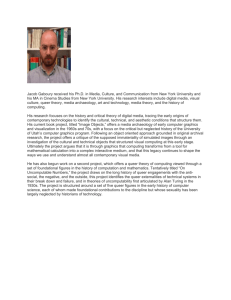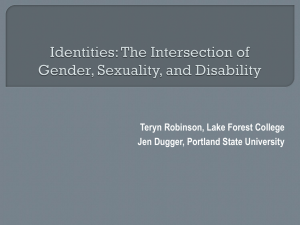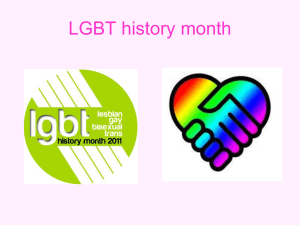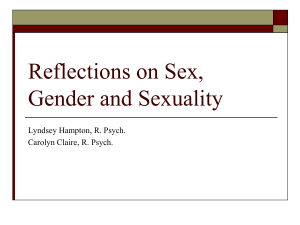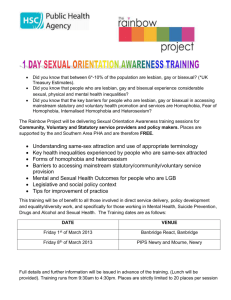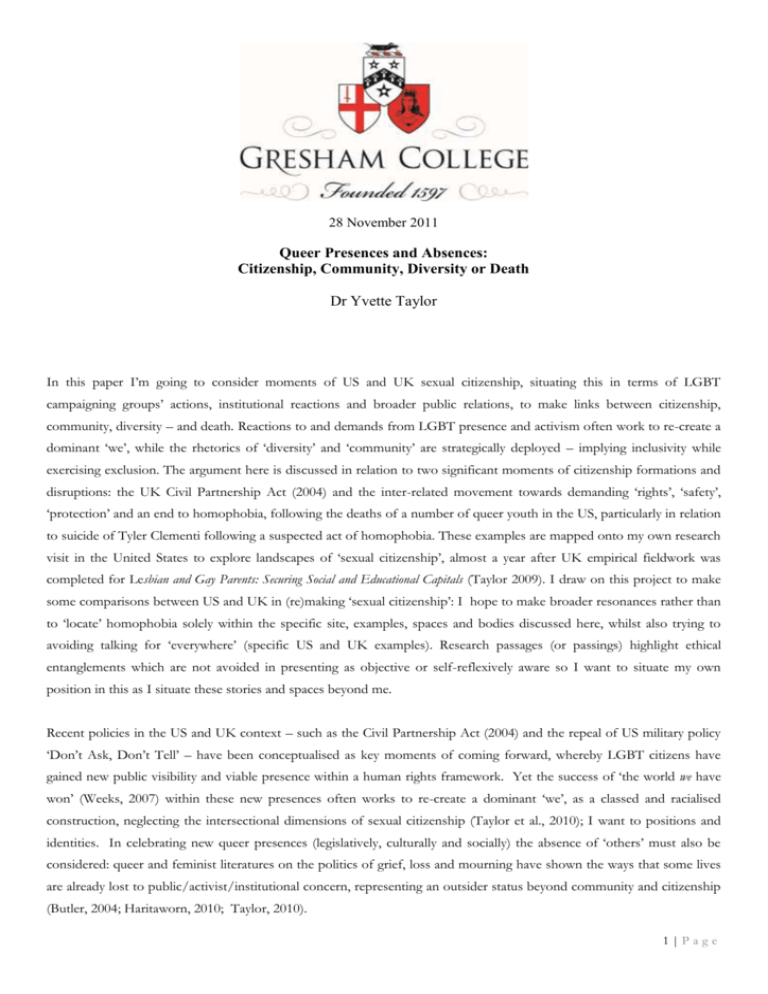
28 November 2011
Queer Presences and Absences:
Citizenship, Community, Diversity or Death
Dr Yvette Taylor
In this paper I’m going to consider moments of US and UK sexual citizenship, situating this in terms of LGBT
campaigning groups’ actions, institutional reactions and broader public relations, to make links between citizenship,
community, diversity – and death. Reactions to and demands from LGBT presence and activism often work to re-create a
dominant ‘we’, while the rhetorics of ‘diversity’ and ‘community’ are strategically deployed – implying inclusivity while
exercising exclusion. The argument here is discussed in relation to two significant moments of citizenship formations and
disruptions: the UK Civil Partnership Act (2004) and the inter-related movement towards demanding ‘rights’, ‘safety’,
‘protection’ and an end to homophobia, following the deaths of a number of queer youth in the US, particularly in relation
to suicide of Tyler Clementi following a suspected act of homophobia. These examples are mapped onto my own research
visit in the United States to explore landscapes of ‘sexual citizenship’, almost a year after UK empirical fieldwork was
completed for Lesbian and Gay Parents: Securing Social and Educational Capitals (Taylor 2009). I draw on this project to make
some comparisons between US and UK in (re)making ‘sexual citizenship’: I hope to make broader resonances rather than
to ‘locate’ homophobia solely within the specific site, examples, spaces and bodies discussed here, whilst also trying to
avoiding talking for ‘everywhere’ (specific US and UK examples). Research passages (or passings) highlight ethical
entanglements which are not avoided in presenting as objective or self-reflexively aware so I want to situate my own
position in this as I situate these stories and spaces beyond me.
Recent policies in the US and UK context – such as the Civil Partnership Act (2004) and the repeal of US military policy
‘Don’t Ask, Don’t Tell’ – have been conceptualised as key moments of coming forward, whereby LGBT citizens have
gained new public visibility and viable presence within a human rights framework. Yet the success of ‘the world we have
won’ (Weeks, 2007) within these new presences often works to re-create a dominant ‘we’, as a classed and racialised
construction, neglecting the intersectional dimensions of sexual citizenship (Taylor et al., 2010); I want to positions and
identities. In celebrating new queer presences (legislatively, culturally and socially) the absence of ‘others’ must also be
considered: queer and feminist literatures on the politics of grief, loss and mourning have shown the ways that some lives
are already lost to public/activist/institutional concern, representing an outsider status beyond community and citizenship
(Butler, 2004; Haritaworn, 2010; Taylor, 2010).
1|Page
Such debates and their complex implications came to the fore around the recent suicide of student Tyler Clementi at a US
campus following a suspected act of homophobia. I argue that the creation of broader publics, as called upon by different
actors in the demand for citizenship, community and diversity, can be seen as contradictory, relying upon and re-creating
privacy as the proper concern and place of civil engagements. This is witnessed in responses to different queer deaths and
the affective relations – from ‘hate’ to ‘love’ – which are generated interpersonally and institutionally in pinpointing blame,
in moving forwards and in securing rights, as a moment of loss and possible gain. I ask which lives are already lost to
public concern, to community activism and institutional comprehension, questions which I suggest are significant to the
dis-junctures in diversity rhetorics and realities often enacted in community claims for citizenship.
I arrived at Rutgers University in early September 2010 ready to research US sexual citizenship, hoping to situate this
against earlier work on UK citizenship, and the intersections between sexuality and class in same-sex parental rights
(Taylor, 2009a). This sense of identification and community in what is the most diverse US public university according to
publicity (‘Jersey Roots, Global Reach’) made me ponder on the advantages and disadvantages of such a strong version of
sameness. The rhetorical appeal of ‘internationalisation’ and ‘diversity’ and the reality of elitism and exclusion within
Higher Education has been widely commented upon, where institutions produce guidelines on ‘dealing with’ diversity
(frequently invoking legal compulsion, employment worth and cultural variety). Yet many have pointed to the structuring
of education as it solidifies, rather than challenges, social divisions, reinforcing a classed and racialised version of
‘community’. The significance of this to sexual citizenship, always played out within a broad landscape of inequality,
community and diversity, became all too apparent in the suicide of a first year Rutgers student, Tyler Clementi, who
jumped to his death from the George Washington Bridge on 23rd Sept 2010. Clementi’s death came soon after two fellow
students allegedly filmed him having sex with another man. In the official response that followed, it was asserted via an
email from the University President that Rutgers is ‘ … extraordinarily proud of its diversity and the respect its members
have for one another … ’. A two year project ‘ … focusing attention on civility in the context of one of the most
culturally and racially diverse research universities in the nation’ was highlighted as a re-commitment to ‘the values of
civility,
dignity,
compassion,
and
respect’
in
shared,
painful
times
(see
Project
Civility1
at
http://projectcivility.rutgers.edu/). I wondered what and whose pain would be shared, owned, claimed and forgotten?
In recalling this my point is not to hold this young person’s life and death up as the shattering point of community: in the
immediate days that followed, the media presence on campus put a spotlight on all; from fellow student residents to those
researching LBGT issues. All were asked to convey what this meant, how to convey ‘Rutgers’ loss’ and what a suitable
response would be – sometimes with a microphone emerging from nowhere to capture and quickly relay those thoughts
across campus and country. Perhaps unsurprisingly many students began to resent such intrusion and the debate shifted
from one of sexuality and LGBT rights to one of privacy for all Rutgers’ students. There was also an increasing tone of
resentment against campaigning groups organising die-in events, speak outs and silent vigils: couldn’t ‘they’ just go away
now and let things get back to normal, understood as a ‘cosy diversity’ where all had suffered and all were now included,
of course (Ahmed, 2009). Responses were both highly visible – re-circulated again through the very technologies (cell
phones, web cams) blamed as the bad objects of ‘today’s youth’ – and yet invisible, as homophobia was mis-placed in
1
Project Civility is a series of events and seminars which promise to reduce ‘hostile encounters’ and increase ‘thoughtful communication’ as part of ‘campus
culture’. A blood donation campaign was also part of these ‘community efforts’ – indicating a very embodied return to larger communities, somewhat problematic
in the context of gay men still being banned from donating blood in the USA.
2|Page
being situated entirely at Rutgers. This pinpointing removed responses from a historical, social perspective more able to
account for homophobia and heterosexism. Most problematically, homophobia was seen to reside wholly in the bodies of
the two young people accused of filming Clementi: two 18 year old students of colour, who then became the targets of
racist abuse (Haritaworn, 2010, discusses a similar racialisation between ‘queer lovers’ and ‘hateful others’). The youtube
clip ‘Targeting Tyler Clementi: Dharun Ravi and Molly Wei commit a Hate Crime’ captured and circulated such racism, where Ravi
and Wei’s ‘hateful’ bodies are displayed in close-up with sinister music playing over the exposure of their ‘evil’ intensions.
We are forcefully told over again that ‘A hate crime occurs when someone commits a crime with the purpose of
intimidating someone based on their sexual orientation’. This may well be true, but it can be asked what other ‘hate’ might
circulate? How might hate be situated not on individual bodies but within society more broadly? Viewing the online
comments after the ‘RIP Tyler’ tribute, one certainly finds much continued hatred, now justified in the very name of
building (the right kind of) ‘community’.
Blame and praise circulates at these moments of community (re)building, as our points of success, shame, loss and gain. At
a speak-out event I listened with disbelief at others’ disbelief: why didn’t these ‘minority’ young people simply know
better? By being ‘minority’ they were dually tasked with a non-discriminatory stance towards all issues, as well as being the
embodiment of institutional diversity.
Formal institutionalisation and retraction of rights intersects with (in)formal structures of participation, including
campaigning groups, differently effecting material and subjective claims-making (Taylor, 2007, 2009a). Within days of
Clementi’s death, Garden State Equality, a statewide New Jersey LGBT advocacy group, demanded the accused students
be prosecuted for hate crimes and given the ‘maximum possible sentence’. Campus Pride, a US nation-wide group for
LGBT college students, also pressed Rutgers for the pair’s immediate expulsion with little mention of an investigation or
disciplinary hearing. Online endorsements circulated as over 18,000 people signed up to press for manslaughter charges.
Signatories called for the accused to ‘return to their countries’, ascribing homophobia to other countries and cultures thus
exempting US society for its deeply ingrained heterosexism: this positioning occurred despite both accused students being
American citizens from the New Jersey area.
Under the banner of ‘Justice Not Vengeance’, a newly formed LGBT group ‘Queering the Air’ decried the rhetoric of
blame and shame as a foil for anti-Asian racism. The centrality of ‘justice not vengeance’ as deployed by this activist group
nonetheless slipped in re-centering a (certain) student as in need of recognition and resources. The main focus of this
group was to attain gender neutral housing for LGBT students at Rutgers, where members’ unique needs and diversity
were to be recognised as part of the institutions’ commitment to ‘diversity’, which was seen to have failed in the
(gendered) allocation of rooms in university dormitories rather than as chosen by students. Diversity was strategically
deployed by this queer group in claiming ‘Our Rutgers, Our Future’ where space and protection was demanded to secure
their privacy by virtue of being ‘diverse’ and in need: the Clementi suicide was seen partly as an outcome of failed privacy
and lack of housing choices. I attended various meetings and was shaken to hear real infringements of privacy and reports
of sexual assault as a fairly common occurrence on US campuses (see Gonzales et al., 2005). Problematically I heard how
these assaults could be publicized, capitalised upon, put to use in this new ‘window of opportunity’ in demanding
institutional responsiveness and securing privacy. This moves public concern and activism back into the private realm as a
supposedly protected – though breached – space; it displaces the danger and differences already in place in leading
3|Page
‘private’ lives, and encourages an individualistic response (as residents) as opposed to an intersectional one more able to
grasp the tensions between broad ‘publics’ and limited ‘privates’. In other words, grief gets rearticulated and reduced as a
loss of personal privacy, even property, devoid of a broader recognition of who is already included and excluded from
constructions of citizenship, residency and community. The group, formed with perhaps the best of intentions and
pragmatic objectives, ended up being pitted against other groups as more pragmatic and outcome driven and, as an
outsider, a visiting queer academic, I felt confused where my affiliations should be assigned. Those who attended other
events – including the Project Civility meetings which were somewhat problematically tasked with ‘restoring community’ –
were made to feel somewhat suspect and not really that queer. My presence was directly queried as my own confusions
were expressed (I was asked if I was from the media, being unrecognizable to these inside-outsiders). My own quick
criticism cannot necessarily convey political and ethical complexities but in both institutional and activist responses the
detachment between culpability and capability was stark, re-inscribing a binary between those who were to blame (the
accused students, the institution) and those in need of saving (LGBT students with unique and diverse needs, institutional
reputations). I was as told that your ‘silence won’t protect you’. I wondered, however, about the claiming of the Black
feminist poet-activists Audre Lorde’s words as part of the official campaigning slogan, easily included at the end of an
email and recited in an all white space (in a ‘diverse’ institution).
So, I retreated to the library and got out a DVD on campaigning for same-sex partnerships in the U.S, interested to trace
the history and divergences between different States' legislative responses. This film told of the struggles and successes of
a couple who, with marriage equality potentially in sight, were campaigning for same-sex partnership rights in all US States.
These women, 'lesbian grandmothers', had cycled across the US, coast to coast, and filmed their thoughts and fights,
naming their release as 'Lesbian Grandmothers from Mars'. Mars, Pennsylvania was the location where one of the
'grandmothers' came from although the play on the alien outsider communicated another fact about the non-recognition. I
took my request to the desk and on returning with the DVD the young man was laughing, somewhat embarrassedly,
somewhat mockingly (a recognizable response in mention of LGBT issues in 'polite' society). Angered by the apparent
failure to take seriously homophobia on campus, in this moment, I asked the young man what he was laughing at? Was it
'Lesbian', 'Grandmother' or 'Mars' that he found particularly amusing? Was the combination just too hysterical, too alien?
On feeling myself to be a specimen I decided to make him the specimen, to probe and puzzle where there was, in fact,
much clarity.
Much campaigning has now occurred inside and outside of Rutgers. The ‘It Gets Better’ Campaign started by openly gay
columnist Dan Savage was initially posted on Youtube and has now launched its own website, (see
http://www.itgetsbetter.org/). On the website there is an opening pledge: ‘THE PLEDGE: Everyone deserves to be
respected for who they are. I pledge to spread this message to my friends, family and neighbors. I'll speak up against hate
and intolerance whenever I see it, at school and at work. I'll provide hope for lesbian, gay, bi, trans and other bullied teens
by letting them know that ‘It Gets Better’’. Youtube clips have been archived on this site, given the enormity of responses,
providing an insight for queer youth into what the future might hold for them (see Vitellone, 2008 for a critique of such
logics): ‘Many LGBT youth can't picture what their lives might be like as openly gay adult ... So let's show them what our
lives are like, let's show them what the future may hold in store for them’ (http://www.itgetsbetter.org/). Celebrities and
ordinary ‘survivors’ are invited to talk about troubled childhoods and developed, successful adulthoods as indicating full
‘recovery’, where bullies by contrast are positioned as ‘losers’, ‘weak’, ‘less worthy’ and ‘inferior’. Vice-President Joe Biden
4|Page
reassures that ‘There’s not a single thing about you that’s not normal, good or decent’, urging us to contribute and make
‘us’ feel better about ‘our country’. Even US President Barack Obama has added his own tale of survival and overcoming
of hardships to the voices which echo ‘It Gets Better’ as an incentive for young queer youth to hold on, keep going and
never kill themselves. The youth of tomorrow are imbued with a regenerative futurity, a multi-cultural ‘diverse’ inclusivity,
but this is denied to those ‘already lost’ to public concern and ‘our’ communities – as homophobic others who should be
expelled from institutions and nations. The ‘Making It Better’ project is available in 15 languages and a UK project has
been launched.
Such sexual stories, circulating via ‘It Gets Better’, can function to re-generate as well as disrupt communities, shaping new
public repertoires around which communities mobilise (Plummer, 1995) and revealing ‘… interconnections of class, race,
nationality, gender – and sexuality’ (Weeks et al., 2001: 196). Many clips from queer people dissent from the happy
message of upward mobility and movement to a queer city, emphasising that some don’t ‘get out’ to be out (Taylor, 2007).
And others too, it seems, function as the sticky repository for the ‘lack’ of tolerance, affluence and becoming. We are
asked to lament the deaths of some – those young people who could have ‘been something’ – yet in this economy of grief
(Butler 2004) others are already lost, serving only to remind us what we are not (homophobic) or what we are now
(diverse). Much discrimination, and even much death, is passed over in these moments, when we remember young white
victims, such as Tyler Clementi, Jamie Hubley, and Matthew Shepard, whose death in 1998 inspired the opening of The
Matthew Shepard Foundation as a forum to ‘embrace diversity’. I am not suggesting that we should forget the grief here
but rather we should remember to situate these horrific incidents alongside the endless forgetting of the loss of young
Black lives, such as Sakia Gunn, a 15-year old African American lesbian, who was murdered in an economically deprived
Black neighbourhood of Newark, New Jersey in 2003 [at the time this wasn’t deemed newsworthy in - or out of LGBT
communities]
The Centre for Social Justice and LGBT Communities was hosting an event in recognition and celebration of ‘diversity’. I
stood in line at the university shop adjacent to the conference space, having squeezed through the crowds, many armed
with badges and ribbons. It was nearly my turn to pay and I moved closer to the register, hearing the man in front asking
'What's going on? Why are there so many gays on campus?' A panic, a hesitation and then a mouthful: 'Is the number of
'gays' on campus problematic for you? Are you saying there are too many?', I asked. Both the customer and the woman
shop assistant asked me to repeat myself; there was no going back once declarations had been made, public outings
delivered, so again I asked. 'Oh no, I don't think there's a problem with gay's on campus' the man replied, rolling up his
sleeves (but it’s not what you think...). He revealed a rainbow wrist band by which, I deduced, I was to deduce that he
himself was gay. I felt I had to explain my outburst, feeling I'd got it wrong: he was 'one of us' and was only being 'ironic',
off-hand, perhaps enjoying the sudden visibility. I said that queer presence on Campus at Rutgers had been problematic
especially of late - by which I meant the intensified media focus and the expressed lack of responsiveness to LGBT
requests for 'safe housing' free from homophobia and not necessarily assigned by gender. The man corrected me. Didn't I
know that wasn't about homophobia? It was, he confidently asserted, about privacy. The woman behind the counter had
rung up my items incorrectly - we were both distracted - and I corrected her. When I should have corrected him: he was
talking (over and as the 'distraction') that the accused students were from 'Asian' backgrounds and maybe 'it' (their implied
guilt) was a result of 'how they'd been brought up'. A bigger panic, a longer hesitation, and a fumbled 'What?' were my
response as he walked out the door into the queer masses. Turning to pay, the woman asked me where my accent was
5|Page
from, 'It's very pretty' she said. Nothing in that conversation had, for me, been very 'pretty'. 'From Scotland', I replied, but
it is me and not just my accent that is from somewhere, meaning that how I was ‘brought up’ goes, on this occasion,
unquestioned; I pass.
In passing hateful, hurtful rhetoric Clint McCance a school board member in Arkansas, commented on queer suicides on
facebook that ‘Seriously they want me to wear purple because five queers killed themselves. The only way im wearin it for
them is if they all commit suicide’ [sic]. Again, quickly upon hearing these comments the ‘It Get’s Better’ Campaign
successfully and very visibly challenged this with an online petition (with an estimated 100, 000 signatures) forcing him to
resign the next day in a live CNN broadcast. But the positioning between ‘hateful’ others and loving words or actions is
not always so straightforward. A Queer Rising event hosted a Love-in at Times Square on 15th October, and the release
called for ‘attention to the power of love’: we are not scary, the email invite declared; we are not ‘threatening’ or ‘shameful’
‘and HATE speech is a DIRECT CAUSE of suicide and violence within our community’ (Queer Rising). Love was to be
articulated, as cure, with couples joining hands – singles were welcomed and encouraged (‘We will be pairing-up single
strangers to hold hands!’). This leave no room to consider this loving coupledom as itself a fundamental part – and
problem – for campaigning groups and the normative polarisation around ‘love’ and ‘hate’.
In relocating sexual
citizenships away from such intimacies and injuries as self-evident truths, there is a need to explore further the way we are
called upon to mobilise the values of ‘civility, dignity, compassion, respect,’ as well as the spaces and sentiments of privacy,
intimacy and care in often very conservative ways.
Instead of attending the Queer Rising (I feared the happy pairings) I went to a local LGBT reception, which was very
structured and organized, albeit in a 'queer' way, with an exhibition on transgender lives (Pioneering Voices: Portraits of
Transgender People) on the wall as you entered the space. I lingered, waiting for more people, somewhat awkwardly
scoping out who may be approached and talked to; where were the undergraduate, postgraduate and staff groups and how
would I negotiate these – as well as 'queer' hierarchies – in this 'mixed' space? In these hesitations the exhibition space and
wall-mounted photographs provided time and space to move back and forward, to be queerly present and yet somehow
detached as a 'viewer'. But such a space often pulls one 'back' or in different, diverse and sometimes divisive directions,
apparent in over-hearing a group of young men discussing transgender images and their mis-readings of lives captured,
portrayed and (mis)understood ('Was she really...', 'Was he really...'). People enter 'queer' spaces with different presences,
histories and assumptions and these manifest on a heightened level, rather than in simply aesthetic responses alone, where
meanings of femininity and masculinity and their embodied (in)difference were cause for tension, laughter and pain. I
moved away, searching for my appropriately defined space within space. Community involvement, engagement and
politics are often (re)done generationally and this reception event was a coming together across boundaries even as these
were re-written. Mindful of this, I warned myself not to be too critical of younger participants who may well not be versed
in queer theory or gender-sexualities studies (I found myself telling myself not to get 'too academic' in an academic
space…).
6|Page
Articulations and realisations of sexual citizenship need to go beyond the patch-work map of legislative rights pursued by
the good campaigner in celebrating our moves forward, our diverse potentialities, or in mourning our injuries. The sexual
skirmishes which have featured in, for example, recent Proposition 82 and US military ‘Don’t ask, don’t tell’ debates
suggest a wider, differential mapping of same-sex rights beyond middle-class universities. In the US context the 1049
protections and benefits extended to married couples under federal law are commonly cited as a reason for same-sex
marriage and, notably, as a way to secure futures and ‘protect’ children. But throughout differential State-by-State
negotiations there has been a dis-connect – or a series of them – where members of ethnic groups (African Americans and
Latinos have been cited) are positioned as homophobic and in favour of reduced LGBT rights. This (mis)positions all
LGBT people as white: it also implies that discrimination based on sexual identity is read as different and separate from
racial discrimination and that sides must be chosen. In queering the place and practice of diversity as individual,
institutional, and activist responses, it is crucial to theorise the constructions, places and possibilities of advantage as well as
disadvantage. The risk in leaving privileged lives unproblematised is that these are understood as fitting, standard and
chosen; as the trajectories of agentic and capable subjects able to take full advantage of citizenship while being injured by
others’ lack, failure and culpability.
Moments of US and UK sexual citizenship reveal intersections between LGBT campaigning groups’ actions, institutional
reactions, broader public relations and interviewees’ lived experience: The logics of inclusions are future-orientated,
including, aligning and cementing certain classed and racialised subjects as future national citizens, while others are cast out
as backward, behind, and lagging, who need to be regulated and/or expelled. These struggles occur over the bodies of
children and young people, where families, institutions, politicians and activists all make claims on their ‘best interests’,
while failing to place such positions in a wider intersectional analysis of class, race and generation, that takes account of
who gets to ‘become’, when the future we anticipate, loose and plan for may be seen as always intersecting such dynamics
(Taylor, 2011c).
Let’s consider the lifelines, ways out of ‘loss’, where the ‘death’ of heterosexual family is often still urgently feared, where a
queer ‘coming forward’ can function as danger; this can be made safe in re-coding ‘family’ as respectably queer, as offering
stable futures, involving responsible subjects, and functioning in the ‘best interest’ of children (Taylor, 2009). This is
apparent in the It Gets Better US-UK campaigns, as it is in the Civil Partnership Act (UK, 2004) and ongoing US debates
on same-sex marriage [David Cameron now welcoming marriage as a sign of - way forward - for the ‘responsible
homosexual’, the good gay]. Both movements suggest a potential ‘straight and narrow’ version of sexual citizenship,
ignoring intersectional axes of oppression, particularly around race and class (Puar, 2010; Taylor et al., 2010). Lesbian and
Gay Parenting: Securing Social and Educational Capitals explores the ‘coming forward’ of certain subjects in moments of
sexual citizenship and the increasing existence and utilisation of ‘rights’, ‘recognitions’ and ‘entitlements’ (Taylor 2009). To
some extent these new demands and rights-based movements represent a success and a securing of (feminist) futures in so
far as claims can be made on the State and new existences secured and materialised: further, Individual and family ‘futures’
are also ‘protected’ and legitimised in these socio-cultural transformations. Again, these gains are troubled in asking just
2
Proposition 8 was a California ballot proposition passed in November 2008. In 2010 the US district judge ruled that the ban on gay and lesbian marriage violated
the right to equal protection under the US Constitution: at present the ruling will remain suspended while Proposition 8's backers attempt to have their case heard
by the court of appeals.
7|Page
whose future are we endorsing, protecting and (de)legitimising? Feminists have long critiqued the ideal of ‘the family’ as
the centre of care/resourcing/recognition. The fantasy of the ‘good parent’ and the ‘good child’ who can be resourced and
propelled into the future is a profoundly classed and (hetero-homo) normative discourse and practice which re-circulates
in current times. Whose movements or ‘coming forward’ into citizenship takes ‘us’ somewhere?
Children act as
condensed signifiers of the future of ‘the family’ and, by extension, the nation: the linear narrative of ‘coming forward’
capacitates some (middle-class) subjects as capable, rendering others as culpable.
In the UK based research, with 60 white lesbian and gay parents from working-class and middle-class backgrounds (aged
18-63 years), interviewees experienced the shifting terrain of sexual citizenship somewhat ambivalently. A consequential
classing of this figures in the erosion or consolidation of ‘worth’, ‘normality’ and ‘entitlement’, through which claims are
made, families are (un)done and citizens are materialised. The issue of economics is significant, resourcing – or denying –
inclusion; class and sexuality also intersect in the construction of ‘normal’, ‘ordinary’ citizens now ready for insertion into
citizenship status (Taylor, 2011b).Both working-class and middle-class interviewees expressed varied uncertainties but the
material and subjective ‘costs’, rather than benefits, of civic acceptance work to disadvantage working-class parents. The
advantages of middle-class parents are re-constituted and re-embedded in changing legal contexts. Such classing – and
racialising – of sexual citizenship has potential implications across different international contexts, where public policies
materialise parenting, spatially situating and legally producing the ‘costs’ and benefits of civic acceptance (Binnie, 2004;
Kandaswamy, 2008).
Some interviewees spoke of doing something ‘completely fresh’, viewing the ability to do things differently as a strange
reversal of usual discriminations, where it was heterosexual couples who could now not chose to do things differently
through a civil partnership. The ability and value in departing from the marriage model was repeated by Elizabeth, where
an alternative way of life was in jeopardy, threatened by assimilation into a ‘traditional’ way:
I think that part of what lesbian and gay couples have got is also a sort of alternative way for the heterosexual
marriage and I don’t think that we should just be sort of seduced down the line of you know ‘oh you can do the
same and it’s like a marriage’ and you know and turn round and say, like an honorary heterosexual couple in that
you’re a married a couple. I think that then we could lose, just some people will be losing what we have that’s kind
of alternative and different and showing a different way of having a kind of family unit … but in terms of I mean
in terms of the legal side the financial things and everything I mean that’s all a great step forward. (Elizabeth, 52,
middle-class)
Finances were often claimed as consolidating advantages, securing children’s futures via material assets, which applied less
to working-class interviewees who lacked such assets and who were often recipients of welfare benefits, which were
increasingly regulated – and cutback - under a frame which demanded visibility of their intimate relations (whether they
were civilly partnered or not) (see Browne, 2011). Here circumstances are related as particularly tricky, both materially and
emotionally where much appears to be at ‘risk’ and complicated rather than clarified in legislative change. The opposition
to civil partnerships were not just theoretical or principled but rather thoroughly practical, where once ‘dis-counted’
partners are assessed for benefits purposes. Thus, the material and symbolic sense of inclusion achieved through
recognition and affirmation is classed, where those with recognised social, economic and cultural capitals can often achieve
8|Page
standing as legitimate subjects. For others the problem lies in the entrenchment of a ‘two-tiered world’ where some faced
being placed firmly in the margins, as other are rescued and redeemed as now in the mainstream. The binary evoked
succinctly illustrates the renewed and heightened boundaries of (un)acceptability between the ‘dangerous queer’ and the
‘good homosexual’, who preferable resides in a ‘gay nuclear family’, living a ‘homonormative’ lifestyle (Berlant, 1997;
Smith, 1997; Duggan, 2002). Once again the good homosexual is placed in opposition to the bad one and sides must be
chosen, or allocated. The option of Civil Partnership can been seen as making this differentiation more concrete, for now
gays and lesbians can either commit and settle down or live in sin. And do gays and lesbians really need more sin?
I think the danger of it is that I think it’s fantastic for people that want to do it, I’ve been to lots. But I think the
danger of it is that it’s creating a sort of two-tiered world where you are kind of jolly and out and no problems and
equal to straight people and then the kind of slightly grotty ones who decide not to. You know, like an underclass,
and I’m in that! (laughter). I’m in that underclass …… again! Back in the margins. And I think, I mean, that’s one
way of looking at it and also, because I’ve done that, I’ve been married and I spent most of my adult life married
… you’re not really going to start wandering back into that world and, you know, I don’t care about the legal and
the financial links really. (Katerina, 52, working-class)
The potential impact of new citizenship entitlements and privileges rests upon what resources one already has, as well as
the security and ability to transfer such resources. Such tensions between possibilities and practicalities were ever present
in interviewees’ accounts, as desires were enabled – and constrained – by what was on offer, simultaneously viewed as a
benefit and a limitation. Many expressed a sense of things being ‘double-edged’, where heteronormativity constructs and
constrains and where the appeal of being ‘normal’ as well as the ever-present threat of being out on a ‘minority limb’ is
ever negotiated, as is the desirability of ‘sameness’.
In celebrating and lamenting queer presences, other lives are rendered absent and beyond the concern of
publics/activists/institutions. The Tyler Clementi case reveals the links between queer politics, sexual citizenship and
diversity paradigms, where certain lives and deaths are already lost to public grieving and calls for institutional and activist
‘inclusion’: I hoped to attend to some of these losses as citizenship gains are sought as a place for ‘our’ cares and
campaigns to be recognised and materialised. Queering citizenship, then, must mean more than citizenship for queers and
must be situated within persistent intersections of race, class and sexuality on and off campus. There are injustices
associated with visibility and invisibility (Adkins, 2000) where the coming forward for some may recreate a dominant
visible ‘we’, able to lay claims to sexual citizenship while effacing broader structural positionalities in terms of race and
class. We are all implicated in the doing of diversity, community and inequality, rather than being at the centre – or
margins – of diversity by virtue of our identities and whether we wear a red Rutgers T-shirt and a rainbow wrist band - or
not. The Tyler Clementi case reveals the links between queer politics, sexual citizenship and diversity paradigms, where
certain lives and deaths are already lost to public grieving and calls for institutional and activist inclusion: we would do well
to attend to these losses as we seek citizenship gains. Incorporating intersectional analysis of sexuality, race and class needs
to be a central part of securing and troubling ‘our’ futures.
©Doctor Yvette Taylor, Gresham College 2011
9|Page

